Geeho Kim
Relaxed Contrastive Learning for Federated Learning
Jan 10, 2024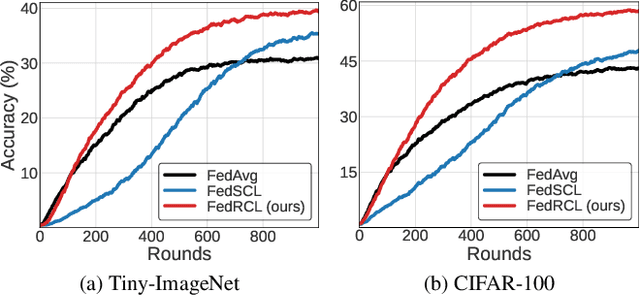
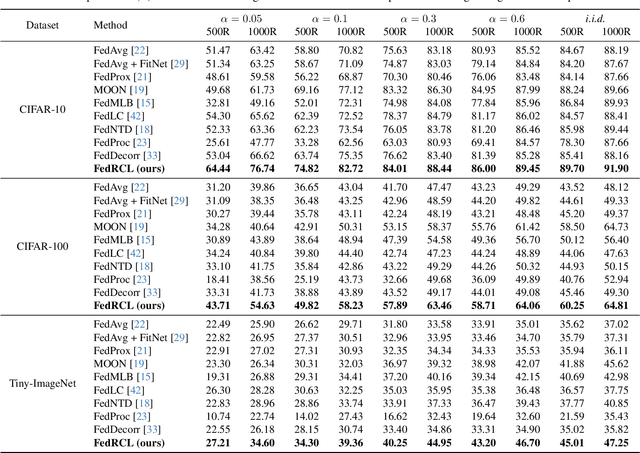
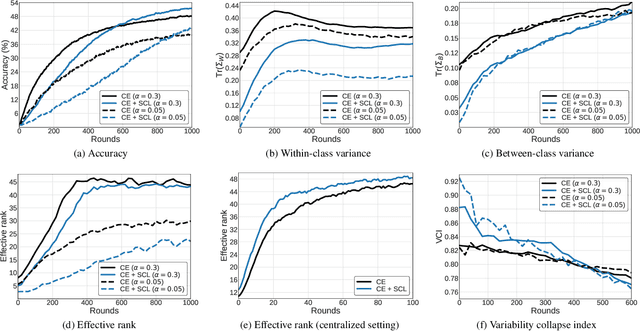

Abstract:We propose a novel contrastive learning framework to effectively address the challenges of data heterogeneity in federated learning. We first analyze the inconsistency of gradient updates across clients during local training and establish its dependence on the distribution of feature representations, leading to the derivation of the supervised contrastive learning (SCL) objective to mitigate local deviations. In addition, we show that a na\"ive adoption of SCL in federated learning leads to representation collapse, resulting in slow convergence and limited performance gains. To address this issue, we introduce a relaxed contrastive learning loss that imposes a divergence penalty on excessively similar sample pairs within each class. This strategy prevents collapsed representations and enhances feature transferability, facilitating collaborative training and leading to significant performance improvements. Our framework outperforms all existing federated learning approaches by huge margins on the standard benchmarks through extensive experimental results.
Multi-Level Branched Regularization for Federated Learning
Jul 14, 2022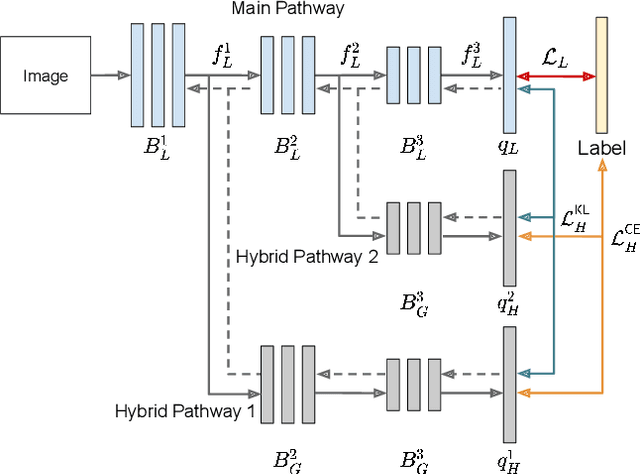
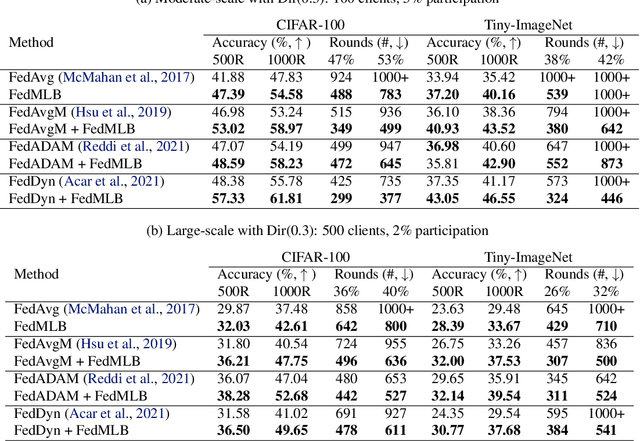
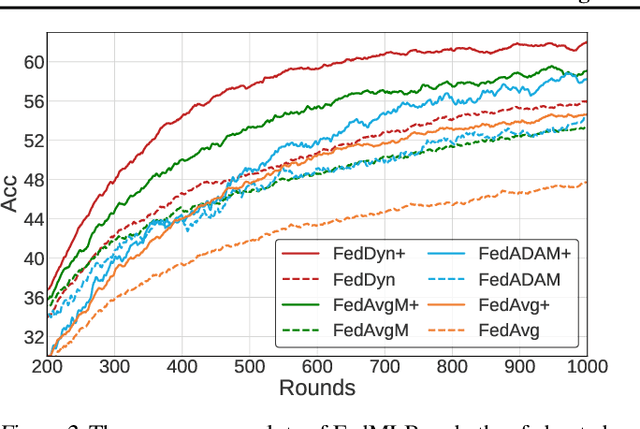

Abstract:A critical challenge of federated learning is data heterogeneity and imbalance across clients, which leads to inconsistency between local networks and unstable convergence of global models. To alleviate the limitations, we propose a novel architectural regularization technique that constructs multiple auxiliary branches in each local model by grafting local and global subnetworks at several different levels and that learns the representations of the main pathway in the local model congruent to the auxiliary hybrid pathways via online knowledge distillation. The proposed technique is effective to robustify the global model even in the non-iid setting and is applicable to various federated learning frameworks conveniently without incurring extra communication costs. We perform comprehensive empirical studies and demonstrate remarkable performance gains in terms of accuracy and efficiency compared to existing methods. The source code is available at our project page.
Communication-Efficient Federated Learning with Acceleration of Global Momentum
Jan 10, 2022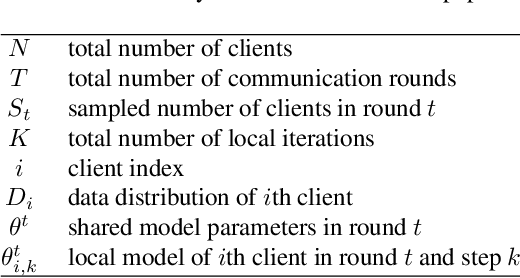



Abstract:Federated learning often suffers from unstable and slow convergence due to heterogeneous characteristics of participating clients. Such tendency is aggravated when the client participation ratio is low since the information collected from the clients at each round is prone to be more inconsistent. To tackle the challenge, we propose a novel federated learning framework, which improves the stability of the server-side aggregation step, which is achieved by sending the clients an accelerated model estimated with the global gradient to guide the local gradient updates. Our algorithm naturally aggregates and conveys the global update information to participants with no additional communication cost and does not require to store the past models in the clients. We also regularize local update to further reduce the bias and improve the stability of local updates. We perform comprehensive empirical studies on real data under various settings and demonstrate the remarkable performance of the proposed method in terms of accuracy and communication-efficiency compared to the state-of-the-art methods, especially with low client participation rates. Our code is available at https://github.com/ ninigapa0/FedAGM
Open-Set Representation Learning through Combinatorial Embedding
Jun 29, 2021

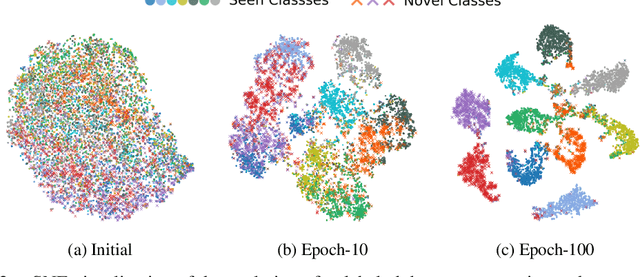
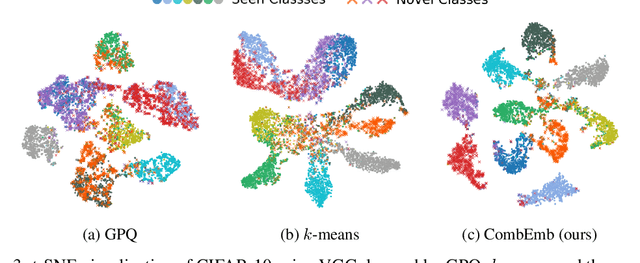
Abstract:Visual recognition tasks are often limited to dealing with a small subset of classes simply because the labels for the remaining classes are unavailable. We are interested in identifying novel concepts in a dataset through representation learning based on the examples in both labeled and unlabeled classes, and extending the horizon of recognition to both known and novel classes. To address this challenging task, we propose a combinatorial learning approach, which naturally clusters the examples in unseen classes using the compositional knowledge given by multiple supervised meta-classifiers on heterogeneous label spaces. We also introduce a metric learning strategy to estimate pairwise pseudo-labels for improving representations of unlabeled examples, which preserves semantic relations across known and novel classes effectively. The proposed algorithm discovers novel concepts via a joint optimization of enhancing the discrimitiveness of unseen classes as well as learning the representations of known classes generalizable to novel ones. Our extensive experiments demonstrate remarkable performance gains by the proposed approach in multiple image retrieval and novel class discovery benchmarks.
 Add to Chrome
Add to Chrome Add to Firefox
Add to Firefox Add to Edge
Add to Edge